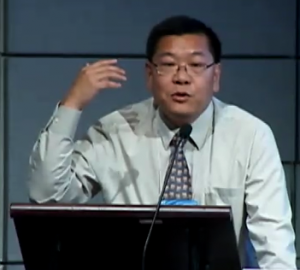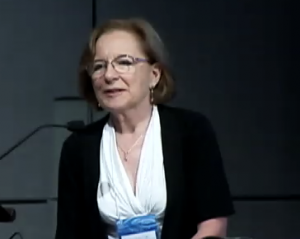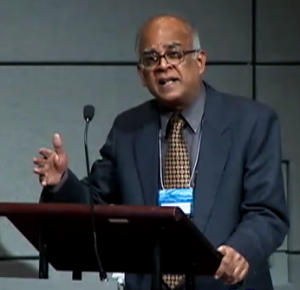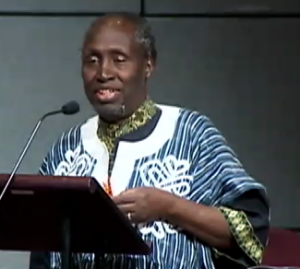Category — Plenary Sessions
NOTHING IN SCHOLARLY COMMUNICATION MAKES SENSE EXCEPT IN THE LIGHT OF OPEN ACCESS – Leslie Chan

Abstract
This year marks the bicentennial of Darwin’s birthday, and the sesquicentennial of the publication of “The Origin of Species”. 2009 also marks the 20th anniversary of the invention of the Web by Tim Berners-Lee. These momentous occasions provide a fitting opportunity to reflect on how the conception of scholarly communication and scientific discoveries have evolved from the time of Darwin to the present. Using the publication of “The Origin” and the subsequent acceptance of the theory of evolution as a case study, we look at how new knowledge was formalized from the vast amount of data collected by Darwin, his prodigious private correspondence and personal notebooks, into the public record in the form of books, journal articles, and public lectures. I argue that just as evolution provides an overarching and coherent framework for organizing and making sense of biological diversity, the Web and open access are providing unprecedented opportunities for the framing and reframing of scholarly inquires, and calling into question the nature of authority in the knowledge production process. I will provide examples to show that just as species are mutable, so too are knowledge domains, authority, and disciplinary boundaries in the open and generative web environment.
July 16, 2009 Comments Off on NOTHING IN SCHOLARLY COMMUNICATION MAKES SENSE EXCEPT IN THE LIGHT OF OPEN ACCESS – Leslie Chan
IBERO-AMERICAN SYSTEMS FOR THE DISSEMINATION OF SCHOLARLY JOURNALS: A CONTRIBUTION TO PUBLIC KNOWLEDGE WORLDWIDE – Ana Maria Cetto

Ana Maria Cetto - PKP conference 2009
Abstract
A vast amount of scholarly journals are edited in the countries of Latin America and the Iberian Peninsula, altogether providing a rich picture of the scientific production in these countries. However, these journals have traditionally not been part of the international mainstream. Different solutions have been sought to increase their access and visibility, using both existing information systems and developing new systems tailored to the needs of the region.
A detailed analysis is made of the presence of Ibero-American journals in the international information scene, and of the efforts to increase their visibility by editors and publishing institutions. Further, an account is presented of the major online information systems developed in the region. The main features of these systems are discussed (including search facilities and free access to journal contents), and how they have influenced editorial practices throughout the region.
Some conclusions are drawn on the challenges that Ibero-American journals face as they seek to strengthen their presence in the international scene.
Click the link below to load the video archive of the plenary session.
July 13, 2009 Comments Off on IBERO-AMERICAN SYSTEMS FOR THE DISSEMINATION OF SCHOLARLY JOURNALS: A CONTRIBUTION TO PUBLIC KNOWLEDGE WORLDWIDE – Ana Maria Cetto
SCHOLARLY COMMUNICATION IN THE AGE OF THE COMMONS – A SOUTHERN PERSPECTIVE – Subbiah Arunachalam

Subbiah Arunachalam - PKP Conference 2009
Abstract
The contours of the geography of science and scholarship have been changing and the change is likely to be even more pronounced in the years to come. The dominance of the advanced countries of the West is eroding and the erstwhile colonies are no longer content to remain hunting grounds for safari science. Some of them are unwilling to play second fiddle to science in the advanced countries any longer and want to be equal partners.
The need for science to be performed everywhere and take roots in all countries is now well recognized.
The toll-access journal system that was set up some 350 years ago and which has served well till a few decades ago evolved, for historical reasons, largely to serve the needs of North-North knowledge exchange and have failed to take cognizance of the aspirations of the South. In addition, the spiraling costs of journal subscriptions have effectively locked researchers from the South out of access to new knowledge and the much-needed international dialogue, thus making the notion of universality of knowledge and science a distant ideal and not a practicable goal.
Even advocates of open access do not fully recognize how important it is today for scientists in the North to learn about developments in the South. The value of South-to-North flow of knowledge was well demonstrated by what happened during medical disasters such as avian flu and swine flu when speedy exchange of not only research results but also research data enabled dealing with the disasters quickly.
Open access to knowledge is not merely important in science but also in development. Organizations such as IDRC and to some extent DFID support open access to all the reports from development projects they support.
If OA is so very important to the South, why is the progress slow? While computers, internet access and bandwidths continue to pose problem in a number of southern countries, in general the situation is improving. The more importan factor is scientists’ apathy. Scientists in the South, by and large, do not exercise their rights to the full; often they give away on a platter copyright to their research papers to journal publishers. The publishers themselves indulge in practices that would entice publishing scientists and librarians to act in ways that would benefit the publishers. Funding agencies and goverments of southern countries are not as proactive as they should be.
Focused advocacy on the advantages of the public commons approach can bring about some revolutionary changes. Such advocacy should be aimed at all levels of stakeholders. Some examples of what is being done in India will be presented.
Click the link below to load the video archive of the plenary session.
Scholarly communication in the age of the commons – A southern perspective
July 13, 2009 Comments Off on SCHOLARLY COMMUNICATION IN THE AGE OF THE COMMONS – A SOUTHERN PERSPECTIVE – Subbiah Arunachalam
SCHOLARLY AND RESEARCH COMMUNICATION: A JOURNAL AND SOME FOUNDING IDEAS – Rowland Lorimer

Rowland Lorimer - PKP Conference 2009
Abstract
This paper introduces a new journal Scholarly and Research Communication. It does so against a background of the desire to maximize the dissemination and impact of research, a goal that complements public investment in research. The paper reviews developments in commercial publishing with special emphasis on the emerging legal relationships between publishers authors and users. Second, it provide an overview of developments in non-commercial scholarly publishing – where things now stand. Third, it identifies what I see as a needed rationalization of functions. Fourth, it introduces to you Scholarly and Research Communication as a venue for research and technical inquiry.
Click the link below to load the video archive of the plenary session.
SCHOLARLY AND RESEARCH COMMUNICATION: A JOURNAL AND SOME FOUNDING IDEAS
July 13, 2009 Comments Off on SCHOLARLY AND RESEARCH COMMUNICATION: A JOURNAL AND SOME FOUNDING IDEAS – Rowland Lorimer
PUBLISHING FOR A GLOBAL CULTURE – Ngũgĩ wa Thiong’o

Ngũgĩ wa Thiong'o - PKP Conference 2009
Information technology is increasingly making the notion of a global village and shared global culture a reality. At the same time, the domination of the world by a few languages, mostly western, has meant the exclusion of large number of languages from a global conversation. Publishing which has always been so central in national conversations and cultures can play a similar role in global conversation among cultures big and small. This means utilizing the possibilities opened by new technologies to bring knowledge and scholarship in marginalized languages out of the shadows so that they can contribute to the common light of global knowledge.

Ngũgĩ wa Thiong'o - PKP Conference 2009
Click the link below to load the video archive of the plenary session.
July 13, 2009 Comments Off on PUBLISHING FOR A GLOBAL CULTURE – Ngũgĩ wa Thiong’o